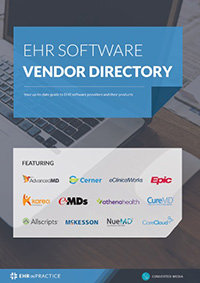Three things to consider when selecting a hospital EHR
Hospitals may have different requirements when compared to smaller practices. As such, the requirements, which underlie the EHR selection process, should differ, as well. Comparatively speaking, a hospital EHR, at its core, will function similar to that of a small practice EHR. However, any similarities between the two types of EHR vanish when moving beyond core functionality.
When considering the scale and complexity of operations present in a hospital setting it is unsurprising that an EHR suitable for a small practice will not be appropriate for hospital use. This does imply that hospital EHRs are more sophisticated. In fact, according to government data, almost 50% of hospitals use an EHR classified as possessing ‘basic’ functionality.
Instead, the differences rest in the ability to scale up to the diverse service lines and large amount of users in the hospital setting, and hospital EHRs should be viewed in light of these considerations. Here are three key considerations for those selecting a hospital EHR.
1. Interoperability
To provide high-quality care, hospitals who operate as a part of a larger system, or within a network, need their EHR to be interoperable across different care settings. In a 2015 Becker’s Hospital Review article, executive vice president and president of client organization for athenahealth Stephen Kahane MD says “We talk a lot about the hospital information system, but to be honest, I don't get it. Most care is delivered outside of that venue. Over half of the revenue in most health systems originates from affiliated, non-employed physicians."
In order to remain patient-centric in such a large environment, it's important for care team members to have visibility on all things going on with patients. A hospital EHR must be interoperable across care settings in the hospital system.
Recommended reading: get through your hospital EHR selection process unscathed with our EHR selection survival guide.
2. Suitability for hospital environment
Hospitals are not a monolith that can be served by a one-size-fits-all EHR solution. Given the diverse nature of hospitals, one should not expect all hospital EHRs to be suitable in all settings. Accordingly, selection teams should consider how an EHR fits into their organizational structure.
For example, a complex hospital system located in a urban area with access to reliable high speed internet may be able to rely on a cloud-based system, whereas a rural hospital with only a few satellite clinics and slower internet, may choose an on-premise EHR that focuses more on sharing information within the hospital rather than with offsite providers.
3. Meaningful Use compatibility
As CMS continues to modify and implement Meaningful Use attestation standards focusing on coordination of care, information exchange capabilities, patient safety and quality of care measures and public health reporting, a hospital EHR should be able to offer these functionalities.
The first takeaway from this list involves conducting an accurate assessment of both present and future institutional needs. Within the scope of an institutions technology strategy there should be a consideration of where an institution will be from an organizational standpoint such as expanding services lines and affiliations with providers. Secondly, there should be a consideration of the regulatory environment presented by CMS, which prods institutions attesting to meaningful use toward the enhancement of certain technology enhancements in their EHR.
Free white paper

EHR Vendor Directory
Get the most up-to-date directory of EHR software vendors. Find the best software for your practice.

Featured white papers
Related articles
-

EHR requirements and key features: your complete guide
Our extended guide to EHR requirements - everything you need to know and more on the subject
-

5 key stakeholders in your EHR selection
Learn about the individuals that, when consulted early and often, can make your EHR selection pro...
-

5 important areas of EHR training during implementation
Successful EHR implementation is not possible without crucial EHR training




